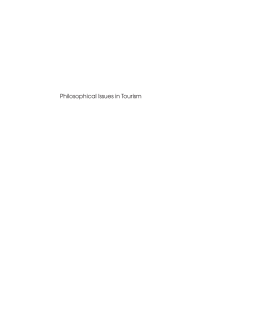
Additional Information
Book Details
Abstract
Despite the geometric expansion of tourism knowledge, some areas have remained stubbornly underdeveloped and a full or comprehensive consideration of the philosophical issues of tourism represents one such significant knowledge gap. A key aim of this book therefore is to provide an initial mapping of, and fresh insights into this territory. In doing so it discusses key philosophical questions in the field such as What is tourism? Who is a tourist? What is wisdom? What is it to know something? What is the nature of reality? Why are some destinations considered beautiful? Why is tourism desirable? What is good and bad tourism? What are desirable ends? These and similar topics are addressed this book under the headings of truth, beauty and virtue.
John Tribe is Professor of Tourism at the University of Surrey, UK. He is Editor-in-Chief of Annals of Tourism Research and Co-Chair of the United Nations World Tourism Organisation Education and Science Council. Previous works in this field include The Art of Tourism, The Truth about Tourism, The Philosophic Practitioner, The Indiscipline of Tourism, Education for Responsible Tourism Action, The Concept of Tourism and Tourism: a critical business.
It is immensely refreshing to see tourism’s potential to nourish values such as truth, beauty and virtue addressed in this fine book. The chapters are theoretically sound and inspiring, and raise important issues of tourism’s future role in societal development. The changes in global consciousness discussed in this timely book suggest that tourism’s successful trajectory must be re-visioned - with values such as ethics, aesthetics and knowledge as critical components. This philosophical book is at once uplifting, provocative and informative.
The book is an excellent and wide-ranging addition to the scarce literature on philosophical aspects of tourism. It will be a valuable source of insights for both working scholars as well as students. The writing of the papers is of uniformly high quality and the technical production of the book is excellent.
Table of Contents
| Section Title | Page | Action | Price |
|---|---|---|---|
| Contents | v | ||
| Contributors | vii | ||
| Part 1 Introduction | 1 | ||
| Chapter 1 Philosophical Issues in Tourism | 3 | ||
| Part 2 Truth: Reality, Knowledge, and Disciplines | 23 | ||
| Chapter 2 Who is a Tourist? Conceptual and Theoretical Developments | 25 | ||
| Chapter 3 What is Tourism? Definitions, Theoretical Phases and Principles | 43 | ||
| Chapter 4 Epistemology, Ontology and Tourism | 62 | ||
| Chapter 5 Post-disciplinary Tourism | 80 | ||
| Chapter 6 The End of Tourism? Nomadology and the Mobilities Paradigm | 101 | ||
| Part 3 Beauty: Well-being, Aesthetics and Art | 115 | ||
| Chapter 7 Tourism and Restoration | 117 | ||
| Chapter 8 Aesthetic Pleasures: Contemplating Spiritual Tourism | 135 | ||
| Chapter 9 Nature, Beauty and Tourism | 154 | ||
| Chapter 10 Tourism and the Aesthetics of the Built Environment | 171 | ||
| Chapter 11 Tourism and the Arts | 191 | ||
| Part 4 Virtue: Ethics, Values and The Good Life | 209 | ||
| Chapter 12 Ethics and Tourism | 211 | ||
| Chapter 13 Good Actions in Tourism | 227 | ||
| Chapter 14 Against ‘Ethical Tourism’ | 244 | ||
| Chapter 15 Development and its Discontents: Ego-tripping Without Ethics or Idea(l)s? | 261 | ||
| Chapter 16 Transmodernity: Remaking Our (Tourism) World? | 278 | ||
| Index | 301 |
